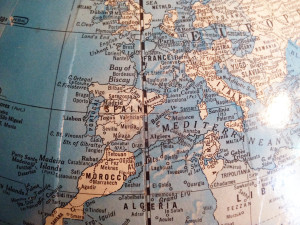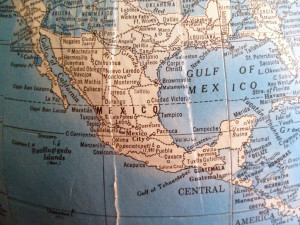Recently we were contacted by a college student who is looking to study abroad. She was looking at Mexico vs. Spain. She had some great questions and concerns. As we’ve served in both areas, we thought we’d share a safety rubric of what recommendations we have for people studying abroad–what to consider and what to look into when looking at a prospective country/location.
=========
Asking whether one country is safer than the other is very difficult to answer. If you compare the US with England, I would say that it depends on where, who, how, etc. Let me explain.

(1) Where: As we are becoming more and more aware of, there are safer areas of Puebla, Mexico than other areas in the city. You could say the same for Madrid. One of my first questions would be to ask where they will be living and working in each city in order to have a better idea. After finding out this information, I’d suggest that they check with an expat living in that country for more clarification. In other words, just because a certain school says it is safe doesn’t mean that it is. Safe is a relative term unfortunately. I find out where and then get feedback from a third party expat who has nothing to gain by having her study there.
(2) Who: Who will she be living with? If she is going to be living by herself, I would have reservations about both countries (or anywhere). Not because I wouldn’t trust her but she is an easy (or “soft” target as they say in the security industry) target if she walks around, works, and lives by herself.
- Host National Family – This would be my preferred option, but it also should be investigated. Are the families “vetted” (home visit, interviews, etc) or simply locals wanting to host an American? In the program we studied in in Seville, Spain, all host families were interviewed, visited in the home, and were very well vetted before ANYONE was allowed to be placed with them. I would advocate something similar if possible especially with a young single female.
- Host Expat Family – Many of the same questions apply here as expats likewise are not perfect. I’d encourage a dialogue with the exat family beforehand, speaking with other expats, and also learning about the location in the city. House rules are important here as well.
- Dorm Situation – Some schools have study abroad programs where students spend the first couple weeks in a hotel and there is heavy, heavy drinking involved. We know of about 3-4 of these and would NEVER recommend the programs. Unfortunately other Americans can be some of the worst influences while studying abroad and I would exercise caution as some of these programs have had drinking deaths, hospitalizations, and drug problems within them as the students are allowed to do pretty much whatever they want without any supervision.
- Self Set-up – Some students go abroad, contact a school, and setup everything on their own. If she isn’t a VERY experienced traveler with great Spanish skills, I personally wouldn’t even consider this approach. I still wouldn’t advocate it as having a sponsoring school in the US, supervisors in the host country, and a host family all keeping tabs not only creates a situation that fosters safety but also one that promotes studying abroad with a purpose…i.e. – learning Spanish, culture, involvement in a local activities, etc
- Umbrella US School – As I mentioned, this is my preferred option. It will reduce the hassles, facilitate ease of credit transfer, make the transition much more bearable, facilitate safety, and provide a very healthy environment for learning that makes the student and the parents comfortable.
- Umbrella Christian US University – Christian schools have pros and cons too. Some of the obvious pros are fostering one’s spiritual formation while abroad and the emphasis on involvement in a local church while there. This was one of the best parts of our entire study abroad experience.
(4) Spain’s Safety

- Overall we’ve rarely ever felt unsafe in Spain. Due to the very limited access to firearms, their violent crime rate is very low. Most of it is petty theft. It’s a developed country, public transportation is great and taxi’s can generally be trusted as we both used them frequently.
- Spanish Food – We never once got sick from the food, you can drink the water from the tap, and the country almost always felt very, very clean.
- Subways – As with any other international city, if you are on the subway in Madrid, Seville, or Barcelona one should be on the lookout for pickpockets and other types of “small” crimes. Spain is not immune to crime nor is any other city in the world.
- “Terrorism” from Al Qaeda – The US had 9/11 and Spain had 3/11 (once-tres) when a subway train was bombed by what were believed to be Al Qaeda Terrorists I think. This is always a possibility but has not occurred much from Al Qaeda since Spain’s new Prime Minister came into power a few years back. The bombing happened two days before the Presidential election and is thought to have been focused on swaying the election. Now that the new government is VERY socialist and much less pro-American, many believe the likelihood of continuing Al Qaeda attacks in Spain has decreased but vigilance must be kept.
- “Terrorism” from Basques – The Basque country has long wanted to separate from Spain to become a separate country (they even put the word “country” in their province name). Due to ongoing disagreements, there have been car bombings in the north of Spain near and inside the Basque province. Other bombings have occurred on the Costa del Sol (Spanish Mediterranean Coast), but seem to always include a call in advance asking everyone to evacuate a pier (for example), and then an hour later it blows up. This is certainly not to say that the Basque people are qualitatively bad people as they are some of the kindest and most hospitable people you’ll meet (at least that is what we were told by a couple who have much more experience there than we’ll ever have).
- The American Issue – As an American, anywhere you go it is hard not to stand out unless you radically change the way you dress, talk, walk, and more. Spaniards can pick us out easily. So can others. If you routinely are aware of surroundings making sure to not go anywhere alone if at all possible including taxis, the subway, and especially at night, the likelihood of anything bad happening is pretty low in our estimation. Keep in mind that my suggestions here are the ideal suggestions to be as safe as possible (you can never be 100% safe anywhere). The reality is that rarely does anyone feel that unsafe in Spain unless they get involved in things they would not normally do in the US (i.e. – all night clubbing with strangers, walking down alleys at night, leaving doors unlocked, etc).
- Location in Spain – If I could state my preference, I’d suggest another location in Spain like Granada, Seville, or Salamanca as they are more University Cities that are very large but not anywhere near the 5 million or so that are in Madrid. Safety wise I’d feel more comfortable overall in all of those than in Madrid.

- As you know, frequently we can make a pretty strong comparison of the Border of Mexico and the US with the Interior of Mexico. I would not recommend studying around the border of Mexico and the US (especially on the Mexico side right now as there have been many murders and kidnappings). But in the interior the same type of violence often occurs as well as has been the case in Mexico City lately and other towns. Our personal (non-scientific and probably somewhat biased) impressions are that we pretty much always feel safer in Spain than in Mexico. I say that with trepidation as we have known many expats who’ve served for 10, 20, 30, or 40 years in Mexico with very few problems and we personally have never been victims of any type of crime in Mexico during numerous trips there.
- Puebla – My impression of Puebla has been that it is a very safe city but like all others has areas that are safer or more dangerous than others. I’ll have to rely on “on the ground” expat expertise on this one. With its proximity to Mexico City, I would prefer to never send Lindsey on a bus alone within Mexico at any time (or even myself for that matter if I can avoid it).
- Buses – Buses in Mexico are generally safe but pickpocketing is possible along with an occasional robbery or holdup. We’ve never experienced this but have sure heard about it. If a 20 yr old female we knew was going to be in Mexico, I’d advise them to as much as possible take the direct and premium buses which tend to be safer and have less issues. I say “tend” because anything can happen. However expats have usually felt comfortable putting us on the nicer charter buses in Mexico.
- Metro – As long as it is utilized during the day and with groups, it should be fine. Long-term expats in Mexico will be able to speak better to the current reality of this one.
- Taxis – Generally okay to utilize if they are “official” taxis or if you have called them over the phone to come get you. However we’ve always been instructed to be very cautious with taxis in Mexico. Pending on the city, the safety can vary but single women should be very careful traveling alone in taxis.
- Food and Water – Caution should be exercised to always drink bottled water and be careful that all food is thoroughly cooked. We almost always get sick at least once in Mexico but that is for only a few days. Great food but dealing with an occasional stomach bug is part of the experience.
- Gang Violence – Lots of this has been occurring lately in various parts of Mexico. Our impression has been that this is a much more noticeable concern in Mexico than in Spain. However we generally felt safe in Puebla as it seemed modern and much less overwhelming than Mexico City or the border towns.
- The American Issue – In Mexico as with anywhere else, Americans will stick out. However the extent to which we stick out in Mexico is a little less due to much more Americans living in Mexico than Spain I would expect. However, an American female should know going in that she is perceived as a “soft” target that could be taken advantage of in many ways (late night taxi, people bump into her and steal things, someone following her home). These same things can occur in Spain and should really be seen as overall concerns for any young American woman traveling abroad.
- Location in Mexico – Puebla or Cuernavaca would be my preferred locations in Mexico especially over a city like Mexico City (which is especially true for a family or a single female). Although I love Mexico City, from our very limited experience there seem to be many more variables to think through and constantly be on the lookout for in Mexico City.









